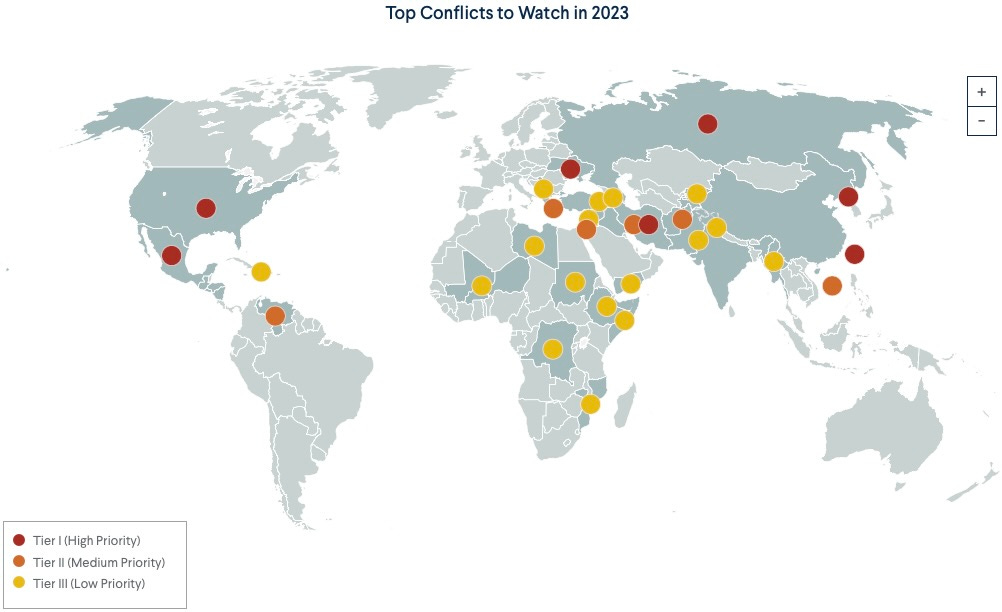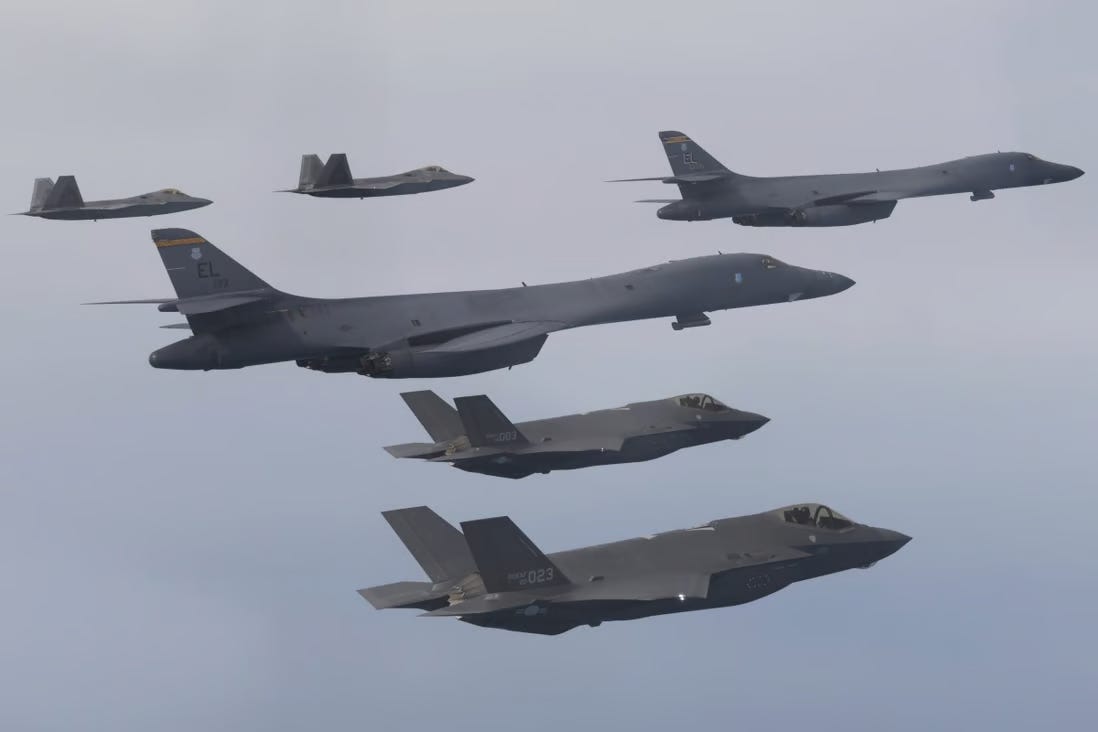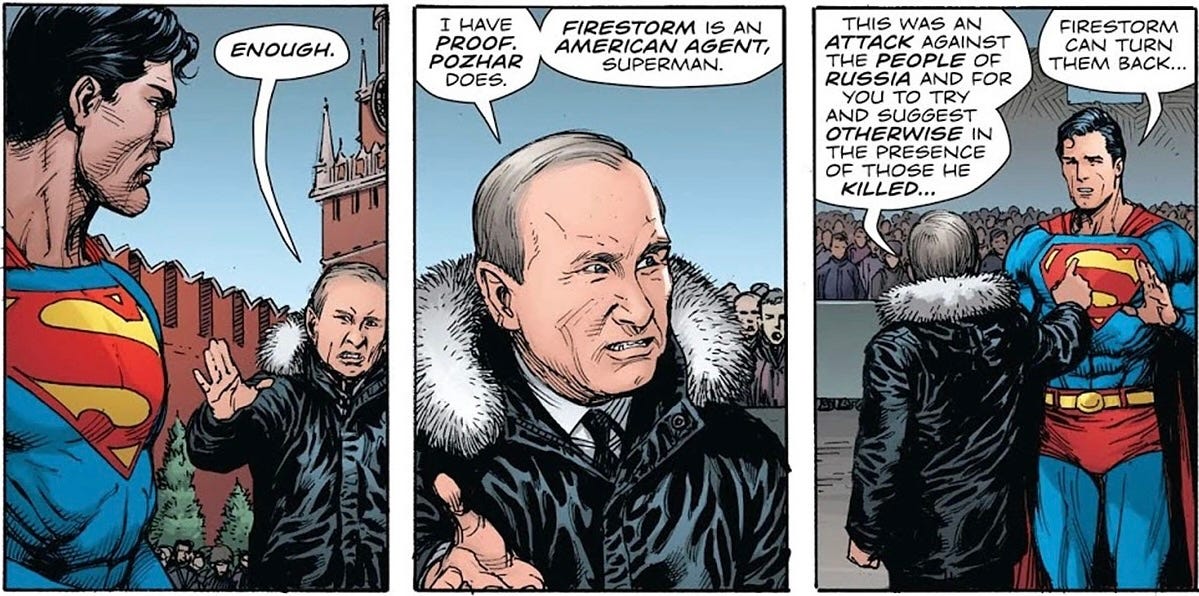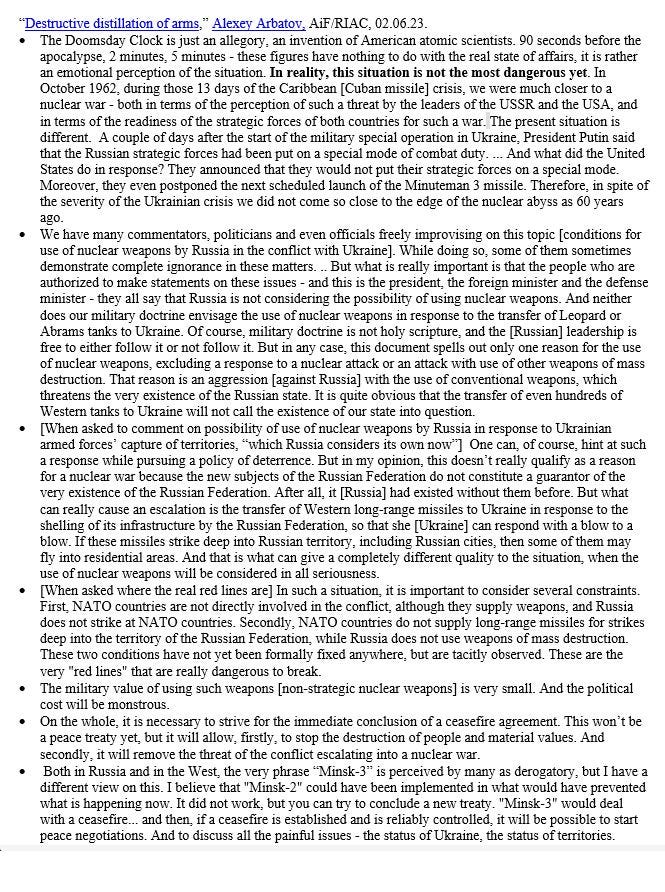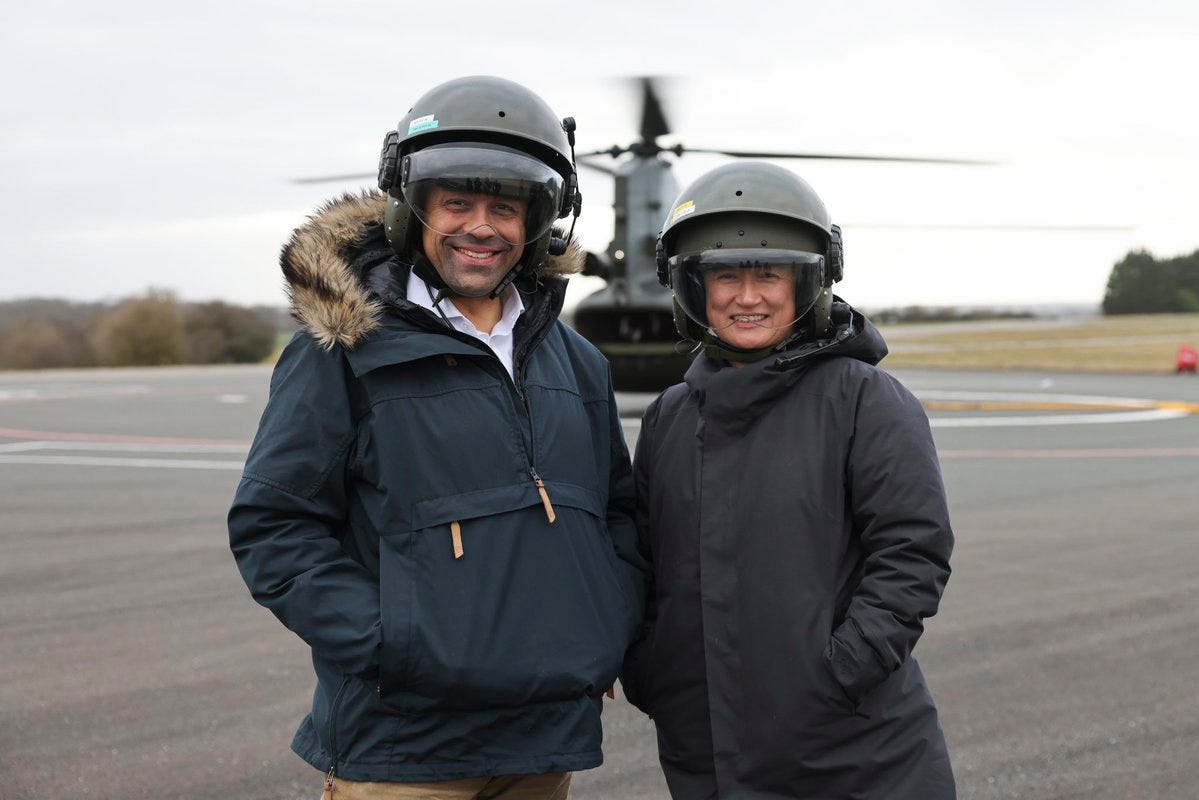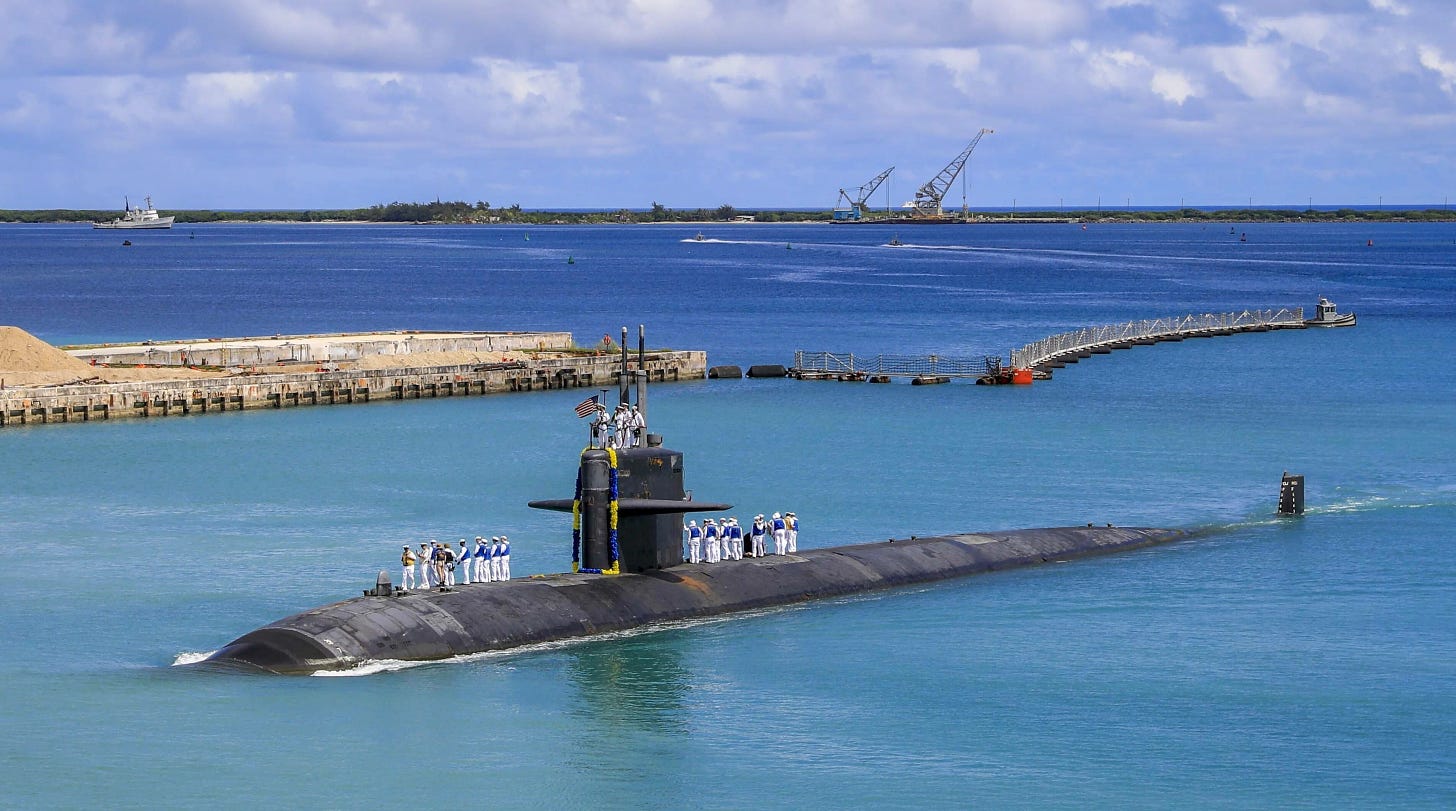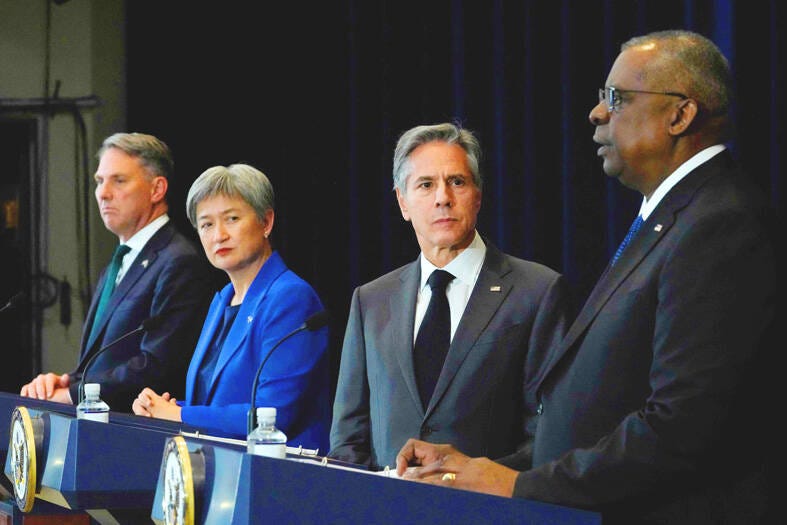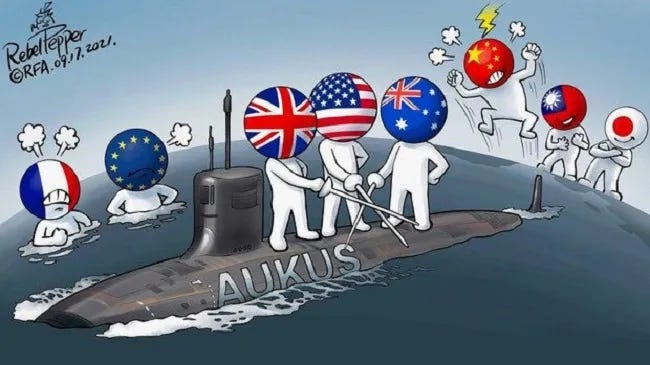Boats and Bombs
Conflicts to watch. South Korea nuclear diplomacy. Doomsday dystopia. Aust FM Penny Wong splits the atom and gets blasted.
UPDATE: Today, the Long Mekong Daily measures the fallout from nuclear narratives from the Asia-Pacific to find its all conflictual and not consensual. As the US militarises the entire so-called Indo-Pacific with Australia’s blessing, ASEAN and the Pacific islands are not for nuclear boats or bombs.
South Korea is thinking nuclear, but AUKUS, not DPRK, let the cat out of the bag. Is the Doomsday Clock Emotional Escapism for Dystopian Do-gooders? Alexey Arbatov interview on scenarios for nuclear weapons use.
Australian FM Penny Wong gave a speech in London and wrote an article which splits atoms over nuclear proliferation, non-proliferation, nuclear propulsion, Indo-Pacific partnerships, and regional peace and prosperity. But Wong is blasted for her views from northeast Asia and is navigating against the tide in Indonesia.
Conflicts to Watch in 2023
The world took a dangerous turn in 2022. High-intensity conflict broke out in Europe—something widely considered unimaginable just a few years ago—while tensions continue to escalate between the United States and China over Taiwan. Meanwhile, the potential for conflict on the Korean peninsula and between Iran and Israel remains high. Interstate warfare, and the potential for its escalation, features prominantly in the Council on Foreign Relations’ (CFR) fifteenth annual Preventive Priorities Survey.
Conducted by CFR’s Center for Preventive Action (CPA) in November, the survey asks foreign policy experts to evaluate thirty ongoing or potential violent conflicts based on their likelihood of occurring or escalating this year, as well as their possible impact on U.S. interests.
Access full story here.
South Korea must reach for diplomacy, not nuclear arms, to defuse tensions with the North
South Korea’s Yoon Suk-yeol administration’s hawkish stance is raising inter-Korea tensions as more Southerners favour nuclear arms, but this could lead to arms proliferation in the region and growing risk of conflict – when a return to diplomacy is needed instead.
Earlier this week, Nato Secretary General Jens Stoltenberg visited South Korea to discuss common security challenges, including the North Korean issue. The meeting was condemned by the North, which has vowed a strong response to Seoul’s increasingly hardline policies.
During the meeting, South Korean President Yoon Suk-yeol asked Stoltenberg and the transatlantic security alliance to play more “active roles” to deter North Korea’s “reckless provocations”. The Nato chief invited Yoon to attend the Nato summit in Lithuania scheduled for July, which the president said he would consider.
Past South Korean presidents have tried to maintain a more balanced diplomacy between China and the United States while focusing more on a diplomatic strategy than a military one regarding North Korea. But the Yoon administration is increasingly adopting a hardline stance. Seoul has chosen not only to respond militarily to North Korea’s provocations but also to openly align itself with Washington and Tokyo.
This latest meeting underscored the Yoon government’s hawkish approach towards North Korea.
Read more here.
Is the Doomsday Clock Emotional Escapism for Dystopian Do-gooders?
A must read: one of Russia's most thoughtful experts on nuclear arms, Alexey Arbatov, has granted an interview to Russian media to weigh in on scenarios for use of such arms and on red lines among other things.
Interview Synopsis (Simon Saradzhyan)
· Arbatov has criticized loose talk about use of nuclear weapons by some of the country’s “commentators, politicians and even officials,” accusing them of “complete ignorance.” In contrast to them, “the people who are authorized to make statements on these issues - and this is the president, the foreign minister and the defense minister - they all say that Russia is not considering the possibility of using nuclear weapons,” Arbatov said.
· Arbatov has also emphasized that Russia’s military doctrine allows first use only if the very existence of the Russian state is threatened in a conventional conflict or if Russia is attacked by WMD other than nuclear arms. At the same time, however, he conceded that Russia may also resort to a nuclear strike if Ukraine uses any missiles supplied by NATO for strikes for strikes deep in Russia and these strikes hit urban residential areas. Delivery of such missiles by NATO will constitute crossing of a Russian redline as would NATO’s direct involvement in the conflict, he said.
· NATO’s red lines, as seen by Arbatov, would be crossed if Russia were to strike NATO countries or use WMD. At the same time, recapturing of lands, which Russian forces had taken in Ukraine, by the Ukrainian army does not qualify as a condition for Moscow’s use of nuclear weapons against Kyiv, according to Arbatov. Arbatov’s view on such recapturing contrasts with warnings made by Putin and some of his key aides have made that Russia can resort to nuclear weapons in the Ukraine war to protect its territorial integrity.
Interestingly, Arbatov made those points in an interview with pro-Kremlin newspaper AiF and the interview was then republished by RIAC.
Read full post here.
Excerpts: An enduring partnership in an era of change
Senator Penny Wong, Australian Foreign Affairs Minister - London
The Indo-Pacific was, in large part, a collection of European and British colonies, Australia among them. Today, Australia sees itself as being in the Indo-Pacific, and being of the Indo-Pacific.
As security and economic dynamics that have held for decades are shifting, […we are] working with partners to uphold the agreed international rules […] defending the rules-based order. Our region is home to the largest military build-up anywhere in the world.
If conflict were to break out in the Indo-Pacific, it would be catastrophic […] Australia sees our investment in our future defence capabilities as essential for deterring conflict and maintaining a strategic balance in the Indo-Pacific..
President Biden’s leadership in putting guardrails for strategic competition on the table is welcome. It is in the world’s interests that his overtures are met.
Our historic AUKUS partnership with the United Kingdom and the United States will help us maintain our capability in the Indo-Pacific into the future, and complement our collective efforts to ensure regional stability and security.
And we are fast approaching a decision on the optimal pathway forward for Australia to acquire nuclear-powered submarines, which will of course be discussed at our ministerial meetings this week.
The deployment of UK and European naval assets to the Indo-Pacific adds to strategic equilibrium and collective deterrence in our region. Our military capability is a key part of how we manage strategic competition – but we must keep focus on diplomacy, economic openness and upholding the rules; working with our regional partners in the Pacific, ASEAN, Northeast Asia and the Quad.
Read the full speech here.
Opinion: Australia Has no Qualification to Talk About Nuclear Non-proliferation and Disarmament
Ri Jong : Member of Korea-Asia Association
A few days ago, the Australian foreign minister Penny Wong contributed an article to British newspaper “Guardian” as it marks 50 years since Australia ratified the Treaty on the Non-Proliferation of Nuclear Weapons (NPT). The article said that Australia, since joining the NPT, has been an example to the world on non-proliferation and disarmament and continued as follows:
“Some have tried to argue that our ambition to acquire nuclear-powered submarines under our trilateral AUKUS partnership risks undermining our exemplary non-proliferation credentials. That assertion misses a crucial fact” the submarines we propose to acquire are nuclear-powered, not nuclear-armed. Other countries in the Indo-Pacific have been operating nuclear-powered submarines for decades.”
The article also tried to justify its ambition to possess nuclear-powered submarines. It quotes: “In 2022, North Korea conducted more than 60 ballistic missile launches. Five Chinese ballistic missiles were reported to have fallen in Japan’s exclusive economic zones. Russia’s reckless and desperate threats to unleash nuclear warfare still loom large, while Iran refuses to comply with its non-proliferation obligations.”
It is a well-known fact that Australia has not been restricted in its open act of nuclear proliferation based on its agreement with the US and the UK on transfer of technology to build nuclear-powered submarines including that of weapon-grade nuclear material after AUKUS, the product of “new cold war”, was formed on September 15, 2021.
It is a well-known fact.
Recently, it is committed to beefing up its military build-up. It is now pushing ahead with the work to conclude a contract to purchase one billion USD’ worth mines on a plea of “threats” from somebody.
This has made Australia to be “an example to the world” in breaking global non-proliferation regime and speeding up arms-buildup in the region and the rest of the world. Thus it has become an object of criticism and concern from most of the countries including its neighbors, going beyond some countries.
Far from repenting of its perilous and wrong actions, the Australian foreign minister justified them in every possible way. This stands as an intolerable mockery of the international community.
In particular, he picked on such independent states as China, Russia, Iran and the DPRK. These countries, without exception, are the ones that the U.S. attempts to curb their growth by every possible means in a bid to isolate and weaken them, maintaining the highest level of hostility and vigilance. This constitutes an act of self-explaining to the whole world Australia’s true colors as a storming party and stooge of the U.S. for fulfilling its foreign strategy.
The U.S. had officially announced the nuclear-arming of its troops stationed in south Korea in July 1957, and deployed 1,000 nuclear weapons in the 1970s and 1,720 nuclear weapons in the 1980s. Thus, the whole territory of south Korea has turned into the largest nuclear arsenal in the Far East.
Moreover, after issuing the “nuclear posture review” in 2002 where it designated the DPRK as the top priority target of its nuclear attack, it has deployed various kinds of nuclear strike means in south Korea on a regular basis, thereby turning the Korean peninsula into the largest theatre of thermonuclear war in the world.
Not content with its regular dispatch of warships and planes to the vicinity of the Korean peninsula since 2018, Australia has even dispatched its tanker plane to participate in the largest-ever U.S.-south Korea joint air drill “Vigilant Storm” from October 31 to November 5, 2022. It is quite preposterous for Australia, which directly took part in usurping our state’s sacred dignity and sovereignty, to talk this and that about our exercise of right to self-defense.
Australia, a member of the “AUKUS” representing its first letter, is running high fever in acquiring nuclear-powered submarines from the U.S. and the UK.
It is the general view of the fair international media that Australia, together with the U.S. and the UK, is the main culprit in causing instability of the region and the world.
It would be better for Australia to bear in mind that if it advances sophistry that can work with nobody, it will only be faced with harsher rejection and isolation from the international community.
NB: The views expressed in the article are not necessarily those of the Long Mekong Daily.
Aukus won’t undermine Australia’s stance against nuclear weapons | Penny Wong
Monday marks 50 years since Australia ratified the Treaty on the Non-Proliferation of Nuclear Weapons (NPT). The NPT’s success in stopping the spread of nuclear weapons has been fundamental to global security over the last five decades.
Over 180 countries, including Australia, have committed not to seek, and to prevent the spread of, nuclear weapons. And as we face the most challenging strategic circumstances in the postwar period, the NPT remains critical to ensuring this security endures.
Our region has seen the largest military buildup anywhere in the world in that time, with limited transparency and reassurance by some states.
In 2022, North Korea conducted more than 60 ballistic missile launches.
Last August, five Chinese ballistic missiles were reported to have fallen in Japan’s exclusive economic zone.
In Europe and across the world, Russia’s reckless and desperate threats to unleash nuclear warfare still loom large, while Iran refuses to comply with its non-proliferation obligations.
At the time the Whitlam government ratified the treaty, unrestrained great power competition between the United States and the Soviet Union threatened the future of humanity. It is why Gough was such a powerful advocate for the NPT.
Since joining the NPT, Australia has been an example to the world on non-proliferation and disarmament. We have promoted the use of nuclear safeguards (measures that ensure a state is meeting its non-proliferation commitments) and we have prevented the spread of other weapons of mass destruction.
We are a leading example for the international community on protecting nuclear material – including through the additional protocol to our Comprehensive Safeguards Agreement with the International Atomic Energy Agency (IAEA).
Australia was the first country to bring such a protocol into force. It requires greater verification to ensure that countries that buy our uranium are not using it to make nuclear weapons.
We work with Indonesia, Japan, the Republic of Korea and others to build practical safeguard capabilities through the Asia-Pacific Safeguards Network.
We keep advancing the objectives of the NPT through the 12 nation Non-Proliferation and Disarmament Initiative, established by Australia and Japan.
And in partnership with the Pacific family, we remain steadfastly committed to the South Pacific Nuclear Free Zone Treaty.
We also welcomed the more recent Treaty on the Prohibition of Nuclear Weapons’ (TPNW) coming into force two years ago.
While we still need to ensure the TPNW contains the verification arrangements and achieves the universal support that has underpinned the NPT’s success, and that it does not undermine the NPT, we share the TPNW’s ambition for a world without nuclear weapons.
The government attended the TPNW First Meeting of States Parties in Vienna in June as an observer – a demonstration we are engaging constructively to identify realistic pathways for nuclear disarmament.
Some have tried to argue that our ambition to acquire nuclear-powered submarines under our trilateral Aukus partnership risks undermining our exemplary non-proliferation credentials. That assertion misses a crucial fact: the submarines we propose to acquire are nuclear-powered, not nuclear-armed.
Australia’s proposed nuclear-powered submarines will not carry nuclear weapons.
Naval nuclear propulsion is not prohibited – but is in fact contemplated – by the NPT.
Other countries in the Indo-Pacific have been operating nuclear-powered submarines for decades – this is not a new capability in the region.
All three Aukus partners have pledged to uphold our legal obligations. And we understand that acquiring this critical capability comes with a responsibility to strengthen even further the non-proliferation regime.
We will also work in lockstep with partners in our region, as we have done for decades, contributing to regional stability and strategic equilibrium in the Indo-Pacific.
In both our endeavours, to enhance Australia’s defence capability, and to support practical action on non-proliferation and disarmament, we seek the same goal – a peaceful, stable and prosperous region.
Our region knows too well the devastating consequences both of nuclear weapons and of conflict. Australia’s non-proliferation and disarmament agenda is as relevant for global security now as it was when we ratified the NPT 50 years ago.
The Albanese government deals with the world as it is, and is committed to taking the practical and meaningful steps necessary to shape it for the better – and we will continue to work for a world free of nuclear weapons.
Penny Wong is foreign affairs minister of Australia
Read full article here.
Indonesia and AUKUS
Indonesia has expressed persistent reservations about AUKUS, the security pact reached in secret between Australia, the US and the UK and announced in September 2021. Under the pact, the three allies will share defence capabilities, with the initial headline item being Australia’s acquisition of a fleet of nuclear-powered but conventionally-armed submarines.
When AUKUS was announced, Indonesia’s Foreign Ministry issued a statement expressing caution. In 2022, Indonesia also submitted a working paper to a UN review of the nuclear non-proliferation treaty critical of the transfer of submarine nuclear propulsion to non-nuclear weapons states.
What underpins Indonesia’s negative response to AUKUS, and how widely are Indonesia’s views shared in Southeast Asia? What can Indonesia’s response to AUKUS tell us about how Indonesia will seek to manage great power competition between the US and China? Might AUKUS spur Indonesia to alter its own defence acquisition plans?




